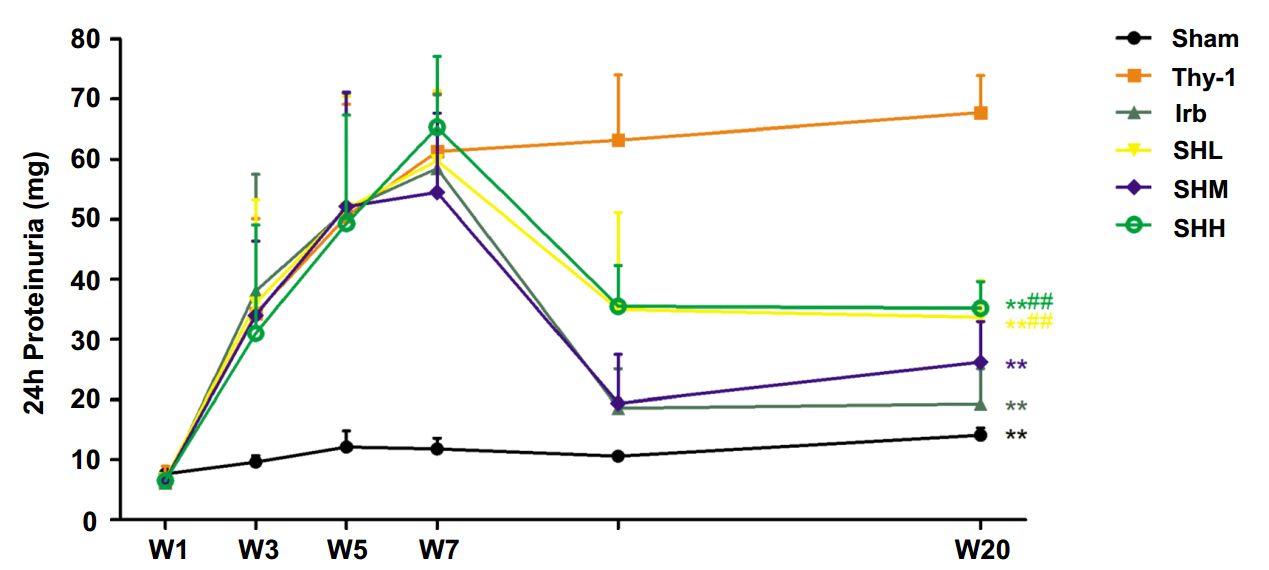With sufficient expertise in disease model establishment, Creative Biolabs provides a wide range of chronic kidney disease models, including surgical models, nephrotoxic models, and immune-mediated models for investigators to evaluate potential novel therapeutics.
Mesangial proliferative glomerulonephritis (MsPGN), characterized by proliferation of glomerular mesangial cells (GMC) and the accumulation of extracellular matrix, is one of the most common types of glomerulonephritis with high incidence globally. Currently, the underlying mechanisms of MsPGN are not fully elucidated and few effective drugs have been developed to treat it.
The Induction of Thy-1 Nephritis
Rat Thy-1 nephritis (Thy-1N) is a widely used experimental animal model for MsPGN studies as well as new potential therapeutics evaluation. To induce Thy-1 nephritis, rats are intravenously administered a rabbit anti-thymocyte serum (ATS) containing antibodies against Thy-1 or a mouse anti-Thy 1 monoclonal antibody by a single injection through a tail vein. Thy-1 antibodies that are injected into rats can bind to Thy-1 antigen presented on GMC membrane, inducing an immune attack.
Characteristics of Thy-1 Nephritis
Typically, there is mesangiolysis due to necrosis and fibrin deposition with monocyte/macrophage infiltration early on by day 2, followed by subsequent mesangial cell proliferation, mesangial matrix expansion, and small crescent formation, which is similar to that seen in variants of human MsPGN such as immunoglobulin A (IgA) nephropathy and Henochl-Schönlein purpura nephritis. The mesangial cell proliferation peaks at about 1 week, and the nephritis spontaneously repairs after 3 weeks. However, Thy-1 nephritis only partially models human MsPGN, as no IgA or other immune complex deposits are found in this model. While extracapillary crescent formation is not diffusely found, some crescent formation accompanies Thy-1 nephritis, resembling active human MsPGN. Moreover, there is hematuria and proteinuria without hypertension in this model.
 Fig.1 The levels of urinary protein in different weeks after injection of Thy-1 antibody. Drug concentrations: SHL (0.75 g/kg), SHM (1.5 g/kg), SHH (3.0 g/kg). (Geng et al. 2016)
Fig.1 The levels of urinary protein in different weeks after injection of Thy-1 antibody. Drug concentrations: SHL (0.75 g/kg), SHM (1.5 g/kg), SHH (3.0 g/kg). (Geng et al. 2016)
Besides, repeated injections of Thy-1 can lead to chronic sclerosis and proliferative lesions with interstitial fibrosis and progressive chronic kidney diseases. In some cases, a combination of Thy-1 injection and uninephrectomy has been established to produce a progressive model, characterized by the development of glomerulosclerosis, perhaps more in keeping with progressive MsPGN in humans.
Creative Biolabs provides all kinds of assessments for testing the effectiveness of potential drugs depending on your research objectives, including but not limited to:
-
Body Weight
-
Blood Pressure
-
Proteinuria Level
-
Serum Creatinine
-
Biochemical Analysis
-
Renal Histological Examination
-
Histopathological Evaluation
Meanwhile, Creative Biolabs also offers other types of rodent urological disease models that you might be interested in:
At Creative Biolabs, a wide array of well-characterized in vivo models and a variety of administration routes and clinically relevant endpoints are available to tailor your urological discovery projects. If you are interested in any of these services, please don't hesitate to contact us for more details.
Reference
-
Geng, W.; et al. Shenhua Tablet inhibits mesangial cell proliferation in rats with chronic anti-Thy-1 nephritis. Biological Research. 2016, 49(1):1-10.
For Research Use Only.

 Fig.1 The levels of urinary protein in different weeks after injection of Thy-1 antibody. Drug concentrations: SHL (0.75 g/kg), SHM (1.5 g/kg), SHH (3.0 g/kg). (Geng et al. 2016)
Fig.1 The levels of urinary protein in different weeks after injection of Thy-1 antibody. Drug concentrations: SHL (0.75 g/kg), SHM (1.5 g/kg), SHH (3.0 g/kg). (Geng et al. 2016)